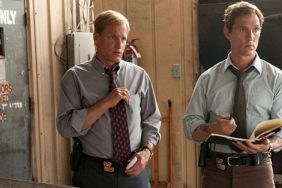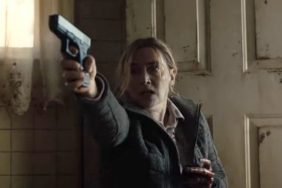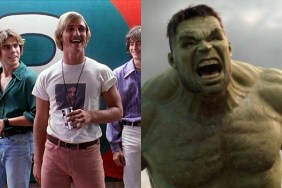Episode Title: “The Long Bright Dark”
Writer: Nic Pizzolatto
Director: Cary Joji Fukunaga
For years, HBO sold itself with the catchphrase “It’s not TV, it’s HBO.” As if the brand itself was responsible for the original shows on the network.
HBO may have a higher percentage of quality series than most networks, but it’s not immune from the occasional misfire. Does anyone else remember “John From Cincinnati” or “Lucky Louie?” Not every show can breakout and become “The Sopranos,” “Six Feet Under” or “Game of Thrones.” But part of the allure of HBO is that it offers greater creative freedoms and it often attracts top caliber talent both in front of the camera and behind it.
“True Detective” certainly benefits from that, with film stars Matthew McConaughey and Woody Harrelson leading the cast. “True Detective” writer Nic Pizzolatto and director Cary Joji Fukunaga may not be widely known, but that may change very quickly because “True Detective” looks like it could be something special. This might be the next great HBO series.
Taking place in two different timeframes, “True Detective” focuses on McConaughey’s Rust Cohle and Harrelson’s Martin Hart, a pair of former detectives who were partnered together in 1995 while investigating a brutal murder. In 2012, both men are called in to give lengthy depositions about the case long after they’ve both left the police department. Hart seems to have weathered the 17 years fairly well, but Cohle can’t even get through the interview without demanding a six pack of beer. Cohle is beyond broken, yet he’s still sharp enough to realize what’s happening in the present as he tells his interviewers to “start asking the right f***ing questions.”
From this point on, there are full spoilers ahead for “True Detective,” so if you missed last night’s premiere episode then you should probably skip this review or else there will be no devil trap for you.
In case you were wondering, the men interviewing Cohle and Hart in 2012 are Detectives Thomas Papania (Tory Kittles) and Maynard Gilbough (Michael Potts). Papania and Gibough are kept offscreen for most of the episode because the show isn’t really about them. It’s about Cohle and Hart, who apparently solved the murder case in 1995 and they were partnered together for seven years before falling out with each other. In that way, “True Detective” is both the beginning and the end of a story. We just don’t know what happened in the middle.
When we meet Cohle and Hart in ‘95, they still barely know each other before getting thrust into the murder investigation of Dora Kelly Lange; a young woman whose naked body is found in a field wearing a crown of antlers with symbols on her body that the responding officers assume to be satanic in nature. They’ve never seen anything like this, but Cohle is certain that this was a performance fantasy of a killer who has done this before.
One of the more refreshing aspects of Hart and Cohle’s relationship is that they don’t really like each other. And not in that buddy cop, opposites attract kind of way. There’s a certain degree of professional respect between them, which is still evident in the way that they talk about each other in 2012. But long before we learn that they haven’t spoken in a decade, it’s clear that they aren’t friends. Maybe they were never friends, but seven years is an eternity for any relationship, personal or professional. It’s hard to picture them lasting that long with the dynamic they had in ‘95.
Hart makes the mistake of asking Cohle to dinner (at the insistence of Hart’s wife) before really getting to know his partner. Once Hart finally gets Cohle to open up, he instantly regrets it when Cohle shares his bleak worldview that human consciousness is a mistake of nature and that mankind should stop reproducing and embrace extinction.
To a God fearing man like Hart, those thoughts are very alarming and he not only warns Cohle to refrain from sharing those opinions again, he demands that their car become “a place of silent reflection.” These early scenes may play into the conclusion of the series. Hart initially assumes that Cohle is a Christian because he keeps a cross in his sparsely furnished apartment. Instead, Cohle tells Hart that he uses it as a meditation technique while contemplating the way Jesus Christ surrendered to his fate and accepted his crucifiction. I think that might be Cohle’s fate in this series, especially since the 2012 cops seem to think that Cohle is connected to an apparent copycat murder inspired by the killer that he and Hart put away 17 years earlier. For reasons that aren’t entirely clear yet, I believe that Cohle might take the fall for that.
I said that Hart is God fearing, but what he’s actually afraid of is anything that challenges his Christian worldview. Hart preaches the virtues of family, but he’s divorced in 2012 and he’s very emotionally distant with his wife, Maggie Hart (Michelle Monaghan) in ‘95. It’s also strongly implied that Hart is having an affair with Lisa Tragnetti (Alexandra Daddario), a court reporter who comes down to the police station to meet with him in private.
Both Hart and Cohle seem to embody a basic idea of human nature: we lie to each other and we lie to ourselves. Hart doesn’t appear to be the family man he portrays himself as, and Cohle isn’t an unfeeling nihilist. If anything, Cohle still feels the pain of losing his child and the end of his marriage… and those wounds haven’t faded with time. Cohle’s strange philosophical ideas are his defense against those feelings and it’s not a particularly effective defense. By 2012, Cohle is barely recognizable as the same person. His pain has devoured him from within, leaving a shell of a man behind.
One of my favorite sequences in the episode was the dinner scene, in which Cohle reluctantly made good on his promise to meet Hart’s family… after he got drunk while fishing for leads at a local dive bar. Hart comes up with a way to get Cohle out of the dinner early and save some face with his wife, but Cohle shocks him by staying. If you look at Hart’s face in that scene, there’s a barely contained rage. He’s furious that Cohle showed up drunk and because he won’t leave. But Cohle seems to genuinely like Hart’s wife and daughters, who may remind him of his own lost family. So for one night, Cohle gets to feel like he belongs to a family again.
The murder case is almost incidental to this story. The focus is clearly on Hart and Cohle as the pilot establishes who they were in the past and who they are in the near present. Because we know nothing about the murderer, it actually makes the unseen antagonist much more frightening than the standard TV serial killer. By the end of the episode, it’s not clear if the killer is playing games with Hart and Cohle or if they’re simply reading too much into the symbolism of the crime and a similar object they come across as they follow a lead.
From a technical standpoint, “True Detective” is really well made. Pizzolatto’s dialogue is sharp and Fukunaga’s visuals are often stunning. And that’s on top of the terrific performances by McConaughey and Harrelson. About the only real flaw in “True Detective” is that it has a very slow and deliberate pace. However, I wasn’t really bothered by that. Some of the supporting characters could use more development, but that’s probably by design. This show belongs to Hart and Cohle, and they feel alive and vibrant. I’m looking forward to seeing where the story takes them in the weeks ahead.






